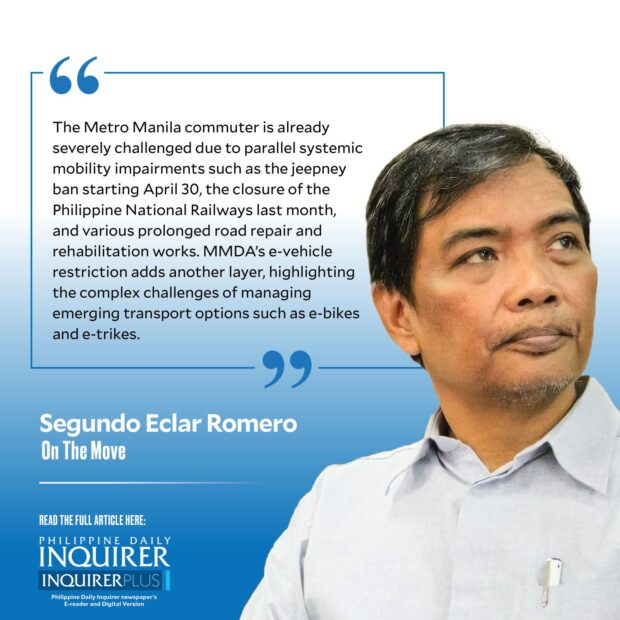E-vehicle ban: Lessons from global practices

The Metropolitan Manila Development Authority’s (MMDA) decision to restrict e-bikes, e-tricycles, and similar vehicles on major thoroughfares has sparked intense debate among commuters, advocates, and the government. While promoting road safety and order is crucial, the implementation of this policy raises vital questions about infrastructure readiness, enforcement equity, and the urgent need for holistic transport solutions that embrace alternative mobility options. Insights from other countries offer valuable lessons.
In fairness to MMDA, its focus on restricting e-mobility use reflects a common tension faced by cities worldwide grappling with the rise of these vehicles. On one hand, there’s a need to ensure the safety of all road users, especially within congested urban environments. On the other hand, e-bikes and e-tricycles offer accessible and often lower-emission transport options, particularly for lower-income commuters who face limited public transport choices.
The key takeaway from successful e-mobility policies is the necessity of infrastructure integration. MMDA’s allowance of light electric vehicles (LEVs) within bike lanes highlights this principle. However, as e-bike and inclusive mobility advocates aptly point out, Metro Manila’s fragmented and broken bike lane network jeopardizes this exemption, rendering e-vehicle users vulnerable.
Article continues after this advertisementWhat are relevant international practices? Cities like Copenhagen and Amsterdam invest significantly in robust, connected cycling networks. This includes designated lanes, traffic-calming measures, and integrated traffic signals prioritizing bikes and other smaller vehicles. (See: “Copenhagen—The best cycling city in the world,” https://bitly.ws/3hCdj).
Taking the cue, the MMDA should provide clearer regulations and adequate infrastructure by (1) collaborating with local government units (LGUs) on comprehensive mapping of existing bike lanes, prioritizing improvements to achieve safe, continuous networks; and (2) considering dedicated or shared lanes for e-bikes with appropriate speed limits, aligning with international standards.
What really strikes fear in the hearts of e-bikers is the concern regarding potential abuse by enforcers. This underscores the need for transparent enforcement procedures and protection of user rights. Many cities abroad offer online platforms for traffic citations that provide not only clarity on violations but also enable online traffic violation adjudication and streamlined appeal processes. (See: Example of traffic fine processing, https://bitly.ws/3hCdx)
Article continues after this advertisementTo ensure equitable enforcement and due process, the MMDA should (1) mandate clear and comprehensive training of enforcers on LEV-specific regulations; (2) establish a readily accessible appeals process for contesting citations; and (3) partner with civil society groups (e.g., Move as One Coalition, AltMobilityPH, PARA) for enforcement monitoring to ensure fairness and accountability.
The MMDA’s limited pre-ban public information and education outreach indicates a need for robust public education. A successful transition requires sustained communication and collaboration with stakeholders. Several cities abroad hold regular forums engaging cyclists, e-mobility users, motorists, and transport planners to refine regulations and address concerns. (See: Stakeholder engagement in transport planning, https://bitly.ws/3hCdB)
To prioritize public education and open dialogue, the MMDA should (1) widely publish the full IRR widely (online and in print, in simplified English and Filipino) for transparency; (2) employ clear, localized on-street signage along restricted roads and bike lanes; (3) initiate a phased implementation plan, beginning with ample warnings before punitive enforcement (fine of P2,500 and impoundment of the e-vehicle) and prioritizing continuing education and promoting understanding of the law; and (4) convene multistakeholder reviews for ongoing assessment and adjustments.
Ultimately, the debate over e-vehicles necessitates a broader conversation regarding Metro Manila’s transportation future. (Such consultation is apparently not in MMDA’s skillset, so it must address this weakness.) It is a mistake for MMDA to demonize e-bikes and e-trikes upon the urgings of the car-addicted public. Pedal-assist models can reduce emissions and congestion when integrated responsibly. Numerous cities worldwide incentivize e-mobility with purchase subsidies, dedicated parking, and integration with public transport systems. (See: E-bike policies across Europe, https://bitly.ws/3hCdU)
To promote e-mobility within a sustainable transport vision, the MMDA should (1) explore collaborative programs with LGUs to establish secure e-vehicle parking zones near public transport hubs; and (2) assess incentives for safe, pedal-assist e-vehicles as part of a climate-conscious mobility plan.
The Metro Manila commuter is already severely challenged due to parallel systemic mobility impairments such as the jeepney ban starting April 30, the closure of the Philippine National Railways last month, and various prolonged road repair and rehabilitation works. MMDA’s e-vehicle restriction adds another layer, highlighting the complex challenges of managing emerging transport options such as e-bikes and e-trikes. By drawing on global examples prioritizing infrastructure, equitable enforcement, public education, and a comprehensive mobility vision, Metro Manila has the opportunity to move toward a transportation system that is safe, inclusive, and sustainable.
doyromero@gmail.com
















